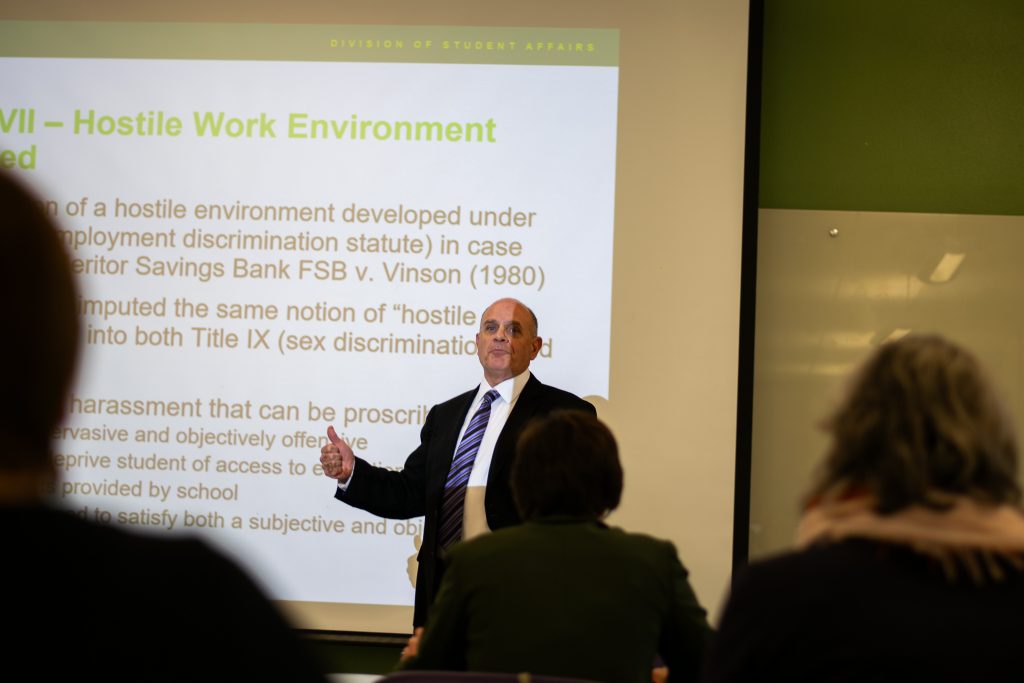Brian Rose, the University’s vice president for student affairs, led a discussion co-hosted with the Faculty Senate on Wednesday. It related First Amendment issues and reports of growing antisemitism on campus to rising tensions surrounding developments in the Middle East and their combined impact on the University’s public image.
Held in the University Union, the talk, entitled “The Challenge of Reconciling Recent DOE Title VI Guidance and the First Amendment,” explored potential conflicts between the First Amendment right to free speech and how the Department of Education’s Office for Civil Rights reviews Title VI complaints specially alleging antisemitism.
Title VI of the Civil Rights Act of 1964, prohibits discrimination, exclusion and denial of benefits based on race, color or national origin at all institutions receiving federal assistance, and the federal government has issued guidance extending these protections to religion. When complaints are filed against colleges and universities, the Education Department’s Office for Civil Rights reviews them, and the institution is immediately placed on a list pending evaluation.
“There’s a PR hit you take from that,” Rose said. “Because nobody understands that all that really means is somebody has filed a complaint and there has been no judgment on the merit of the complaint.”
A Title VI complaint was filed against BU last January by the editor-in-chief of Campus Reform, a conservative media outlet.
Rose said that schools often enter into Voluntary Resolution Agreements with the department, signed before the investigation’s findings are made public. He said that the Office for Civil Rights encourages these deals, which do not constitute an admission of liability or wrongdoing, because they allow universities to get ahead of the accusations, as the office’s findings of fact can be challenged in federal court only after they are released publicly.
“The challenge with that is whenever something becomes politically hyped-up, it generates more complaints, which generates more Voluntary Resolution Agreements, which doesn’t ever get into determining whether some of these things actually meet the legal standard,” Rose said.
Rose mentioned an Executive Order issued by former President Donald Trump in December 2019, entitled “Executive Order on Combating Anti-Semitism,” that required investigators like the Office for Civil Rights to consider the “non-legally binding working definition of anti Semitism” developed in May 2016 by the International Holocaust Remembrance Alliance. This definition said contemporary instances of antisemitism include “Denying the Jewish people their right to self-determination, e.g., by claiming that the existence of a State of Israel is a racist endeavor” and “Drawing comparisons of contemporary Israeli policy to that of the Nazis,” among others.
Rose said that while some criticisms of Israel are considered political speech protected by the First Amendment, under this expanded definition, others may be deemed antisemitic and create a hostile environment on campus — a Title VI violation.
He elaborated on the challenges separating political criticism of the Israeli government and an individual using free speech protections as a shield for antisemitism.
Unprotected speech, including true threats and fighting words, was also explored during the talk. Rose said a threat to everyday activity must be obvious and clear, as an institution cannot limit a student for their political beliefs or expression on the basis of “undifferentiated fear or apprehension of disturbance.”
“Before you could ever take action against something, you have to be able to establish that it is reasonable to think that there will be a material and substantial disruption that interferes with the normal activities of the school,” Rose said.
Rose noted pressure from the SUNY chancellor and general counsel to ensure Title VI violations do not characterize the SUNY system. Even when a Voluntary Resolution Agreement is signed, he said the suggested courses of action do not include outright punishing the speaker — though intimidation can often be used. He said there are ways for a school to support Jewish students without punishing those who express dissenting political beliefs.
“We should be willing to explain the current status of the law as we understand it, and that we shouldn’t, because its politically expedient or expedient from a public relations point of view infer, imply, that we can do something we can’t do,” Rose said, clarifying that he speaks for himself, not on behalf of the University.



